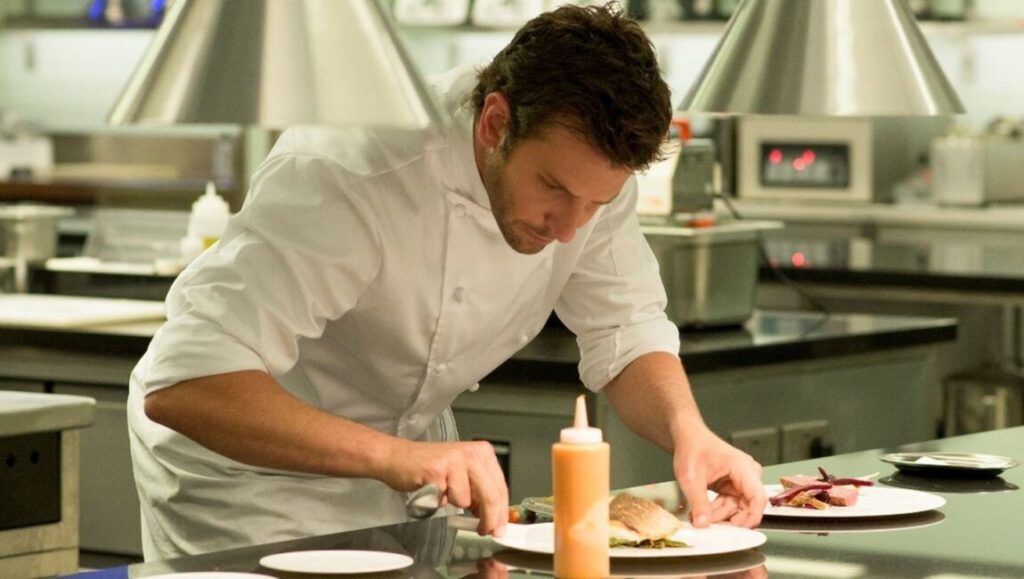The re-emergence of the culinary arts as part of the zeitgeist has been an evolving narrative for the past decade, most noticeably found on the small screen with fully-dedicated cable channels and network reality shows. Burnt banks on this built-in relevancy and familiarity in telling the story of Adam Jones (Bradley Cooper), a once-renowned chef in Paris who has majorly flamed out thanks to years of alcohol abuse, drug use, and general dickishness. Heading to London after three years of self-imposed hard-labor-as-penance, Jones seeks redemption and transcendence in reestablishing his presence in the larger gastronomic world. Functionally, thisis a step-sibling to the tortured artist film, and in much the same way those succeed, Burnt thrives for awhile despite a pedestrian character arc thanks to interplay between the narrative and the film’s visual flair. Director John Wells takes full advantage of the food world’s vibrancy, preferring breakneck cuts of kitchen chaos — flambéing pans, flashing knives, anonymous hands plating delicate garnishes of brilliant color — before reining in to relish in the beauty of the artists’ creations. Visually, this is elevated food porn, the lavish simplicity of the dishes always preceded by the turmoil of the process. And for a while, the histrionics of this approach effectively mirror that of its lead, a man perpetually on the edge, seeking to keep the demons at bay through the pursuit of perfection. The melodrama of his circumstance and his general odiousness are temporarily forgiven as the audience is invested in this particular variation of life imitating art.
Wells damns the film with an extra two minutes of demonstrably pat resolutions.
Unfortunately, Burnt’s final third brings an apparent coup from director Wells. In considering who to blame for Burnt’s unraveling, it seems only fair to rule out screenwriter Steven Knight (of such innovative scripts as Locke andEastern Promises) and place blame on the man who so thoroughly botched the film adaptation of August: Osage County. There, Wells demonstrated a grievous miscalibration of emotional resonance, preferring the overblown to the subtle at every opportunity. He employs the same here. At one point Jones, melodramatically bidding farewell to a former flame, proffers, “You’re better off without me. It’s a long, dark road ahead,” and this could fairly be interpreted as a warning to the audience concerning Burnt’s climax and denouement. It becomes clear that the litany of characters introduced in the film’s early bit of heist-film team-assemblage are mere window dressing; the groundwork is laid for potentially affecting relationships to be explored between Jones and the supporting cast—including a maître d’ who’s had a crush on Jones for years (Daniel Bruhl), an aggrieved longtime friend (Omar Sy), and a single mother enduring the rigors of the high-stakes culinary world (Sienna Miller)—but instead they are proven to exist only in service of establishing the lead’s unshakeable dynamism, despite his past transgressions. Add in an entirely superfluous and undeveloped romantic interest to top it off, and the film’s devotion to celebrating its antihero at the expense of credible character development or dramatic restraint becomes oppressive. A particular bit of late-narrative trickery momentarily adds a little fun to the generally fast-sinking proceedings and suggests the potential of a satisfying ending, but Wells damns the film with an extra two minutes of demonstrably pat resolutions. While the director’s fetishistic eye for the rhythms of the kitchen make Burnt visually satisfying, and help mask its shortcomings for awhile, that sensibility proves irreparably detrimental when Wells singularly focuses on his main character. Perhaps it shouldn’t surprise that a film so reliant on visual verve in the early going would navigate its way to an end so devoid of subtlety, but it doesn’t make the ultimate destination any less disappointing.

